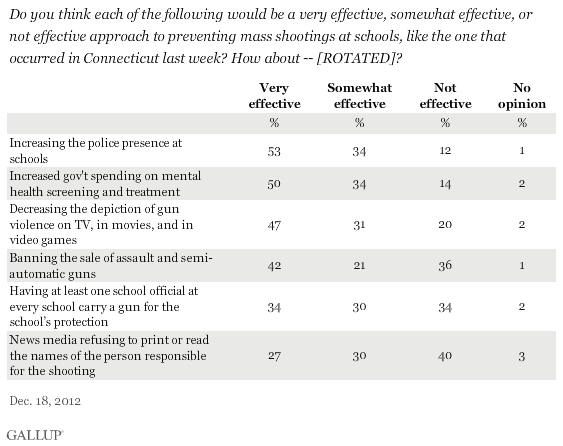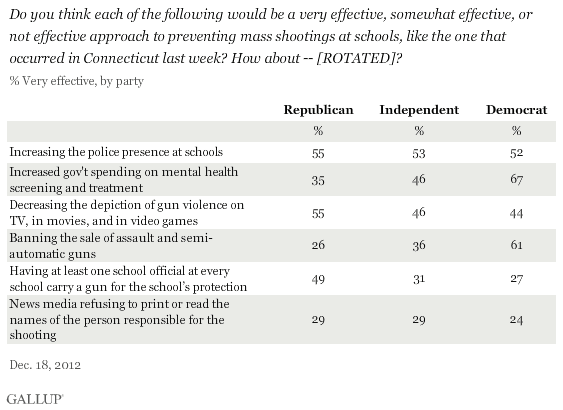PRINCETON, NJ -- Americans are most likely to say that an increased police presence at schools, increased government spending on mental health screening and treatment, and decreased depiction of gun violence in entertainment venues would be effective in preventing mass shootings at schools. Americans rate the potential effectiveness of a ban on assault and semi-automatic guns as fourth on a list of six actions Gallup asked about.

The tragic shooting deaths of 20 school children and six adults at Newtown, Conn., on Friday has left elected officials, leaders, and average citizens highly focused on what could be done to prevent such shootings in the future.
A question included in Gallup Daily tracking on Dec. 18 listed six possible preventative actions. Respondents were asked to rate the effectiveness of each in terms of "preventing mass shootings at schools, like the one that occurred in Connecticut last week."
Much of the discussion since Friday's devastating mass shooting has focused on the potential efficacy of new laws on gun sales and ownership. Forty-two percent of Americans say that banning the sale of semi-automatic weapons would be "very effective" in preventing mass shootings. Another 21% say such actions would be "somewhat effective," and 36% say they would be "not effective."
Americans rated the effectiveness of three potential actions higher than the semi-automatic weapon ban. But it is clear that Americans are not overwhelmingly convinced that any of the actions would be highly effective in preventing future school shootings.
- Slightly more than half (53%) of Americans say that increased police presence would be very effective. This action is at the top of the effectiveness list.
- The only other action that a majority of Americans view as very effective is government spending on mental health screening and treatment -- 50% say this would be very effective.
- Forty-seven percent say decreasing media and video game gun violence would be very effective.
Americans were least likely to say that arming at least one school official at every school and the news media refusing to publicize the name of the shooter would be very effective strategies.
Democrats Most in Favor of More Mental Health Spending, Assault Gun Ban
There are major partisan differences in the ratings of several -- but not all -- of the potential actions tested.
The biggest differences between Democrats and Republicans are on the banning of assault weapons -- 61% of Democrats rate it as very effective vs. 26% of Republicans -- and spending more on mental health actions -- 67% of Democrats say it would be very effective vs. 35% of Republicans.
Democrats are less positive than Republicans about the effectiveness of arming school officials and decreasing the depiction of gun violence in the media and in video games.

There is little difference in attitudes across party lines in views of two of the actions tested: a refusal by the news media not to publicize the name of the shooters in these incidents and an increased police presence at schools.
Bottom Line
Americans don't hold the belief that any one action -- at least out of the six tested in this research -- would be overwhelmingly effective in preventing future mass shootings at schools. At most, 53% say that an increased police presence at schools would be very effective; leaving almost half who say that such an action would be somewhat or not at all effective.
The focus since the Newtown shootings has been primarily on new gun laws. Various U.S. representatives and senators have either introduced or have promised to introduce new gun control legislation over the past several days. President Barack Obama has talked about new gun laws, and his appointment of Vice President Joe Biden to head up the White House task force to reduce gun violence will no doubt focus heavily on gun legislation. Many Americans, however, apparently continue to harbor doubts that laws, such as a ban on semi-automatic weapons, would be highly effective in preventing future mass shootings at schools.
Gallup polling conducted after previous high-profile incidents of gun-related mass shootings has shown similar attitudes in relationship to gun control. Open-ended questions asked after the tragic incidents at Virginia Tech and in Tucson, Ariz., found that respondents were more likely to suggest means of preventing these shootings that did not involve gun control than to mention preventative steps that did involve gun control.
More recently, a CBS News poll conducted after Friday's shootings found that only 26% of Americans said that stricter gun laws would have done a lot to prevent the Newtown shootings. Half said stricter laws would have had no effect.
Gallup is updating its long-term trends on gun control and will report the results next week. It is likely that support for stricter gun laws will go up. Whether or not this public support stays higher will not be evident until months have passed. The horrific nature of this latest mass shooting, however, and the fact that it involved young children, could mean that the Newtown shootings will serve as a tipping point in Americans' attitudes on preventing gun violence not seen after previous incidents.
Survey Methods
Results for this Gallup poll are based on telephone interviews conducted Dec. 18, 2012, on the Gallup Daily tracking survey, with a random sample of 1,009 adults, aged 18 and older, living in all 50 U.S. states and the District of Columbia.
For results based on the total sample of national adults, one can say with 95% confidence that the maximum margin of sampling error is ±4 percentage points.
Interviews are conducted with respondents on landline telephones and cellular phones, with interviews conducted in Spanish for respondents who are primarily Spanish-speaking. Each sample includes a minimum quota of 400 cellphone respondents and 600 landline respondents per 1,000 national adults, with additional minimum quotas among landline respondents by region. Landline telephone numbers are chosen at random among listed telephone numbers. Cellphone numbers are selected using random-digit-dial methods. Landline respondents are chosen at random within each household on the basis of which member had the most recent birthday.
Samples are weighted by gender, age, race, Hispanic ethnicity, education, region, adults in the household, population density, and phone status (cellphone only/landline only/both, cellphone mostly, and having an unlisted landline number). Demographic weighting targets are based on the March 2011 Current Population Survey figures for the aged 18 and older U.S. population. All reported margins of sampling error include the computed design effects for weighting.
In addition to sampling error, question wording and practical difficulties in conducting surveys can introduce error or bias into the findings of public opinion polls.
Polls conducted entirely in one day, such as this one, are subject to additional error or bias not found in polls conducted over several days.
View methodology, full question results, and trend data.
For more details on Gallup's polling methodology, visit www.gallup.com.
